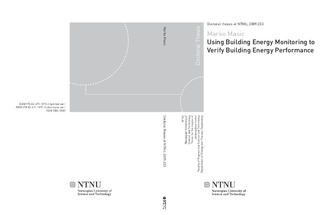Using Building Energy Monitoring to Verify Building Energy Performance
Doctoral thesis
Permanent lenke
http://hdl.handle.net/11250/233414Utgivelsesdato
2009Metadata
Vis full innførselSamlinger
Sammendrag
This thesis has two main goals: (1) to develop a linear regression model of the heat consumption of space heating and ventilation systems and (2) to evaluate operation and maintenance problem detection, by comparing actual heat consumption and predictions gained through linear regression modeling.
This thesis discusses the influences that determine space heating and ventilation system heat consumption. Data with different resolutions capture heat consumption variations to different degrees. Data with higher resolutions introduce more information into calculations. However, the dynamic processes of heat transfer make data with higher resolutions less suitable for calculation than data with lower resolutions. This thesis evaluates the extent of different influences (outdoor air temperature, wind speed and solar radiation) through stepwise regression analysis of the heat consumption of six space heating and five ventilation systems. A comparison of the goodness of fit between calculations with data with different resolutions shows the extent of variation due to the heat transfer dynamic processes.
Heat consumption predictions for four ways of grouping data (hourly, hour-of-day grouping, mean values grouped by regimes and daily data) are compared. Calculations with daily data produced the most accurate predictions of heat consumption in analyses presented in representative literature and articles. There is a strong interest in producing hourly heat consumption predictions because they are more suitable for operation and maintenance problem detection. The heat consumption of HVAC systems operating with control regimes has not been evaluated in the relevant literature. Calculations with daily data collected from a system with control regimes might produce less accurate predictions than calculations with other data. This thesis analyzes excluding outliers to improve the accuracy of the model and explores necessary monitoring period length in order to obtain accurate predictions.
Heat transfer dynamic processes (the thermal storage effect) are generally considered to be insignificant in the literature for daily heat consumption. Introducing the time-lagged variable that describes changes in the mean daily temperature will show if the thermal storage effect significantly influences daily heat consumption.
A tool developed in Matlab is used for problem detection in the operation of nineteen buildings of Norwegian University of Science and Technology (NTNU). Linear regression calculations are incorporated in the tool. Operation and maintenance problems are detected by comparing actual and modeled heat consumption. The resulting predictions were accurate enough to recognize system operation faults. Even if modeled predictions were not precise enough due to the thermal storage effect, the tool user can interpret prediction errors by following outdoor temperature changes and corresponding heat consumption in parallel.
